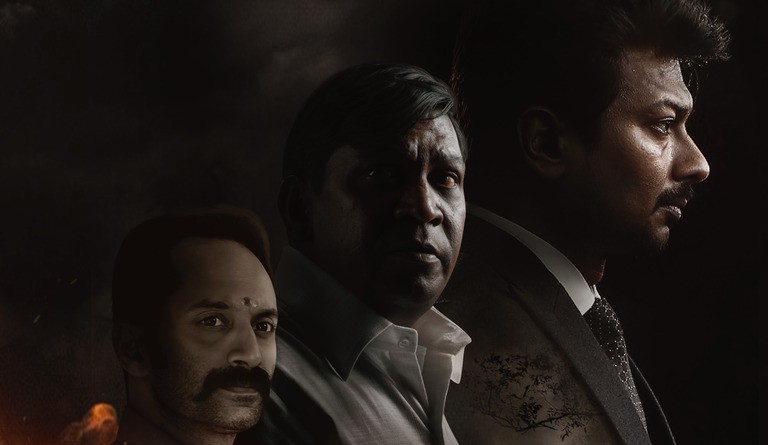

A journey of the oppressed rising against their oppressors, Maamannan occasionally finds its wings, but ultimately fails to soar as strongly as its predecessors. Directed by Mari Selvaraj, the film stars an ensemble cast that includes Udhayanidhi Stalin, Vadivelu, Fahadh Faasil with Keerthy Suresh and Lal.
In the titular role, Vadivelu as MLA Maamannan delivers a poignant performance, with his weathered face conveying the weight of time and experience. His character arc is masterfully crafted, and he gradually gains insight into the oppressive system. The true contradiction of his character lies in his treatment of others, valuing them as equals while yielding to a slave mentality in the presence of those above him. His awakening and realization of his own mistreatment are brilliantly depicted in a remarkable interval block, leaving a lasting impact.
Related: 17 Best Tamil Movies of 2022 You Can Stream Now!
Fahadh Faasil’s portrayal of Rathnavelu is nothing short of terrifying, despite the character’s one-dimensional nature. His brutal portrayal of a hubristic character is utterly convincing.
I once read that Quentin Tarantino was enraged by the final act of Roots, where the main character chooses not to retaliate against his slave master. In Django Unchained, Tarantino rectifies this by giving the protagonist a chance for revenge. Similarly, Udhayanadhi Stalin’s character, Athiveeran, relentlessly fights back against those who oppose him and his father; reflecting the director’s unyielding battle against caste discrimination.
Mari Selvaraj’s distinct use of animal symbolism is prominently displayed in the film once again. Rathnavelu owns hunting dogs, while Athiveeran raises pigs. Through the historically associated stigma of pigs, it becomes evident that this choice serves as an allegory, representing the oppressed rising against their oppressors. This powerful imagery is further brought to life through a compelling drawing showcased within the film.
The director’s brilliance was evident in the film, with captivating ideas that unfortunately didn’t fully translate on screen. Although the movie had exceptional dramatic moments scattered throughout, there was a lack of cohesion in its overall execution. Initially, Maamanan proved to be an intriguing slow-burn, skillfully exploring themes of father-son relationships, power dynamics, and the intersection of caste and politics.
However, the narrative failed to consistently mesh together. In the second half, the film veered towards a more commercial plot, becoming predictable and reminiscent of scenes from other political movies like Aayutha Ezhuthu and Sarkar.
From the depths of oppression, the realization emerges: all men are born equal, and those who rise against it become emperors of their own destiny. However, while Vadivelu’s voice in Maamannan sings once more, regrettably, the film stands as the weakest within Mari Selvaraj’s oppressed vs oppressor trilogy.
Follow Sid (the Author) on IG – @cheeeekyponnama
Eternal Code (2019), written and directed by Harley Wallen, is a sci-fi thriller that delves… Read More
Regarding Us is a drama-comedy that traces the delicate intersections of identity, faith, and found… Read More
A world where no one can go outside and everyone lives alone in tiny rooms… Read More
The Devil’s Left Hand brings together elements of horror, mystery, and thriller under the direction… Read More
Fear Street: Prom Queen marks the fourth entry in the popular Fear Street film series,… Read More
Hold Me, Softly is an indie romantic drama from Ina Tiernan Bailey, shot in Phoenix… Read More
We use cookies, just to track visits to our website, we store no personal details.
View Comments
Was looking forward to watch it. Thanks for the review.